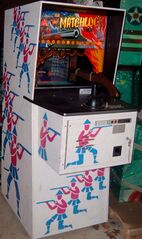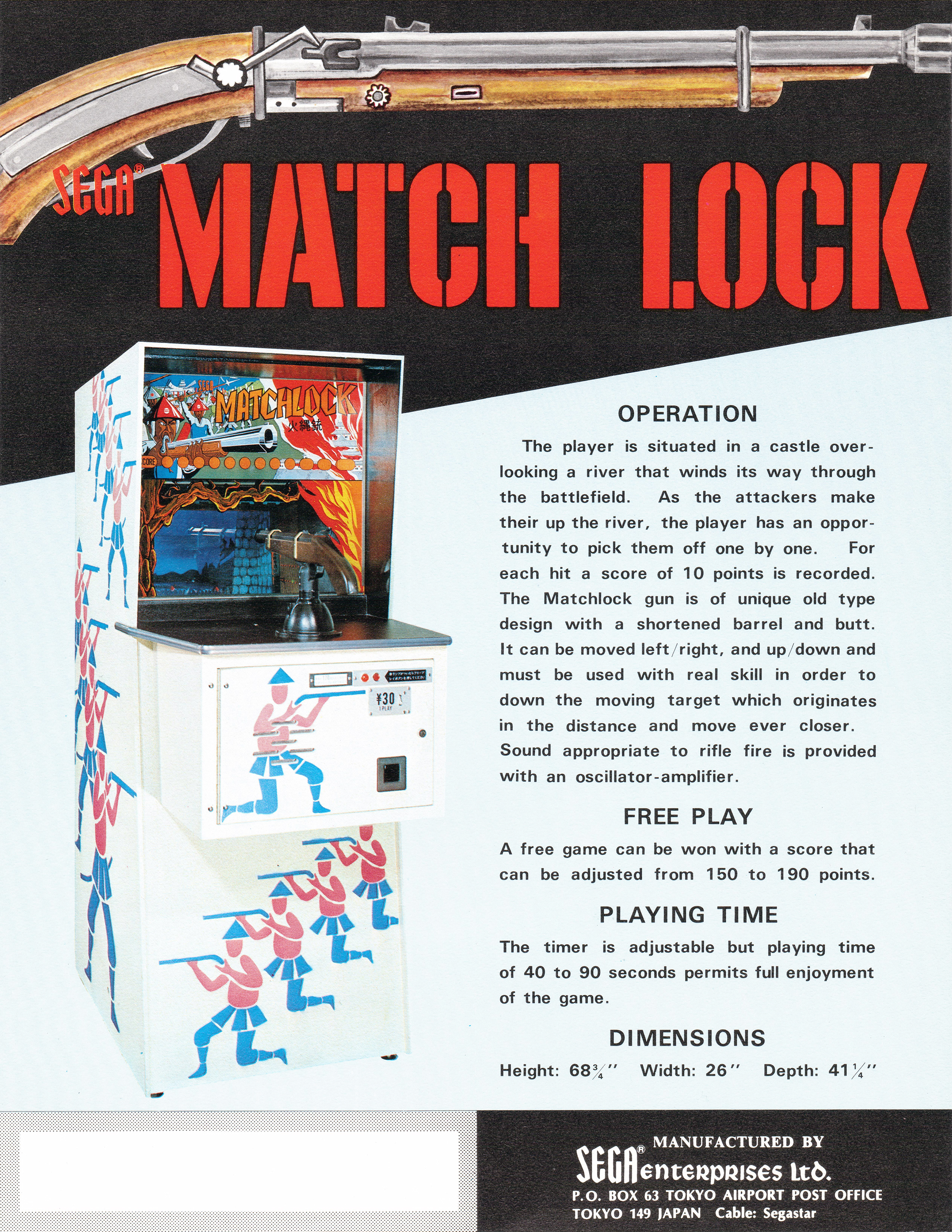Difference between revisions of "Matchlock"
From Sega Retro
m (Text replacement - "==Promotional Material==" to "==Promotional material==") |
Hyperspeed34 (talk | contribs) |
||
| (21 intermediate revisions by 5 users not shown) | |||
| Line 1: | Line 1: | ||
{{Bob | {{Bob | ||
| − | | | + | | image=Matchlock machine1.jpg |
| − | + | | publisher=[[Sega Enterprises, Ltd.]] | |
| − | | publisher=[[Sega]] | + | | developer=[[Sega Enterprises, Ltd.]] |
| − | | developer=[[Sega]] | + | | system=Electro-mechanical arcade |
| players=1 | | players=1 | ||
| − | | releases={{ | + | | genre= |
| − | | | + | | releases={{releasesArcade |
| + | | em_date_jp=1972{{ref|https://web.archive.org/web/20230819003054/http://thetastates.com/eremeka/1970s.html}} | ||
| + | | em_rrp_jp=340,000{{fileref|SEGA Price List 1972-09-01 JP.pdf|page=6}}{{fileref|SEGA Price List 1973-01-01 JP.pdf|page=9}}{{fileref|1977SegaPriceList JP.pdf|page=6}} | ||
| + | | em_date_us=1972{{ref|https://web.archive.org/web/20230819003054/http://thetastates.com/eremeka/1970s.html}} | ||
}} | }} | ||
}} | }} | ||
| − | ''''' | + | {{stub}}'''''{{PAGENAME}}''''' is an electro-mechanical arcade shooting gallery game developed and manufactured by [[Sega Enterprises, Ltd.]] Released exclusively in the United States in 1972, it is notable for its early use of [[wikipedia:Solid-state electronics|solid-state]] digitized sound samples. |
==Specifications== | ==Specifications== | ||
| − | + | ===Dimensions=== | |
| − | + | {{Dimensions|hi=68.75|wi=26|di=41.25|diagramsize=150}} | |
| − | |||
| − | == | + | ==Gameplay== |
| + | On a [[wikipedia:History of Japan#Feudal Japan|feudal Japanese]] battlefield, players are tasked with shooting oncoming hordes of ''[[wikipedia:Ashigaru|ashigaru]]'' (足軽) foot soldiers with a swivel-mounted replica of a ''[[wikipedia:Tanegashima (gun)|tanegashima]]'' (種子島) matchlock rifle (the weapon is more commonly known as a ''hinawajū'' (火縄銃), the kanji for which appears on the cabinet itself.{{fileref|Matchlock machine2.jpg}}) Enemies approach the player's [[wikipedia:Japanese castle|Japanese castle]] (城) in diagonal rows, and upon being shot, dramatically emit a digitized scream. | ||
| + | |||
| + | The replica matchlock rifle is notable for using built-in recoil to simulate firing an actual weapon. | ||
| + | |||
| + | ===Scoring=== | ||
| + | Each successful hit is worth 10 points, and a free game is awarded between 140 and 190 points. | ||
| + | |||
| + | ==Photo gallery== | ||
<gallery> | <gallery> | ||
| − | + | Matchlock machine2.jpg|Front view | |
| − | + | Matchlock machine3.jpg|Playfield | |
| − | + | Matchlock machine4.jpg|Matchlock gun | |
</gallery> | </gallery> | ||
==Promotional material== | ==Promotional material== | ||
| − | + | {{gallery | |
| − | + | |{{gitem|Matchlock flyer1.jpg|Flyer}} | |
| − | + | }} | |
| − | + | ==References== | |
| − | + | <references/> | |
Latest revision as of 02:41, 5 November 2024

| |||||||||||||
| Matchlock | |||||||||||||
|---|---|---|---|---|---|---|---|---|---|---|---|---|---|
| System(s): Electro-mechanical arcade | |||||||||||||
| Publisher: Sega Enterprises, Ltd. | |||||||||||||
| Developer: Sega Enterprises, Ltd. | |||||||||||||
| Number of players: 1 | |||||||||||||
|
This short article is in need of work. You can help Sega Retro by adding to it.
Matchlock is an electro-mechanical arcade shooting gallery game developed and manufactured by Sega Enterprises, Ltd. Released exclusively in the United States in 1972, it is notable for its early use of solid-state digitized sound samples.
Contents
Specifications
Dimensions
Gameplay
On a feudal Japanese battlefield, players are tasked with shooting oncoming hordes of ashigaru (足軽) foot soldiers with a swivel-mounted replica of a tanegashima (種子島) matchlock rifle (the weapon is more commonly known as a hinawajū (火縄銃), the kanji for which appears on the cabinet itself.[5]) Enemies approach the player's Japanese castle (城) in diagonal rows, and upon being shot, dramatically emit a digitized scream.
The replica matchlock rifle is notable for using built-in recoil to simulate firing an actual weapon.
Scoring
Each successful hit is worth 10 points, and a free game is awarded between 140 and 190 points.




